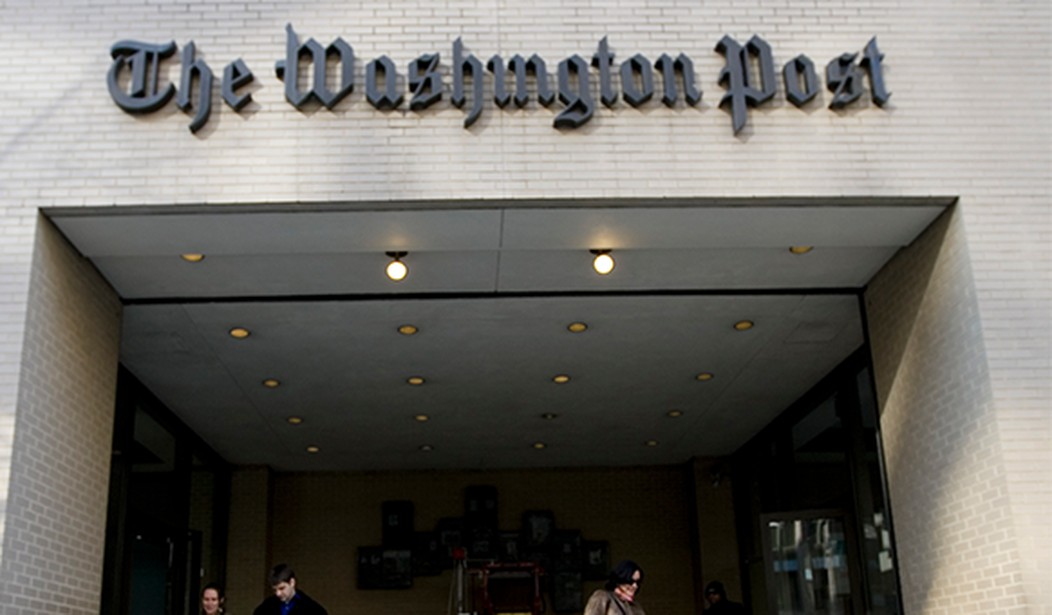The Washington Post believes that “Democracy Dies in Darkness,” How do we know they believe that? It’s plastered all over their masthead.
What used to be on a newspaper’s masthead meant something — at least to the newspaper and its employees. It was a combination company motto and statement of principles. The New York Times still has “All the News That’s Fit to Print” on its print edition masthead. The historical website Read, Write, Think claims that Adolph S. Ochs, the owner of The New York Times in 1897, created the famous slogan “as a declaration of the newspaper’s intention to report the news impartially.”
Obviously, a misprint.
Be that as it may, the Washington Post has certainly come a long way from adhering to that motto. In fact, two of their writers — Naomi Nix and Sarah Ellison — spend about 2500 words trying their very best not to even mention the mechanism that ensures democracy will never die in darkness.
That would be the First Amendment.
Instead, Nix and Ellison seem inordinately concerned about misinformation in the political sphere. This is all well and good. Misinformation is bad. “Bad, Bad, Bad,” as Dr. Seuss might say.
But the writers kinda, sorta, mostly forgot one important thing; they neglected to define what misinformation in the political sphere is.
Jacob Sullum of Reason.Com
As is typical of this journalistic genre, Post reporters Naomi Nix and Sarah Ellison never address the question of what counts as “misinformation,” a highly contested category. Nor do they grapple with the content moderation problem of how to deal with politicians who say things of public interest that are arguably or demonstrably untrue. And although they allude to a constitutional challenge provoked by the federal government’s efforts to restrict speech on social media platforms, they never mention the First Amendment. That is a pretty striking omission by people whose profession relies on that amendment’s protections and who claim to be worried about the health of our democracy.
Definining “misinformation” is not like defining “obscenity” or some other free speech concept. Justice Potter Stewart’s famous “I’ll know it when I see it” retort about how to define obscenity only points to the difficulty in maintaining the integrity of the FIrst Amendment in the face of onslaughts from right and left.
The definition of “misinformation” is almost entirely subjective and, hence, resistant to any sort of empirical analysis about what is misinformation and what might be a disagreement in interpretation.
Why the responsibility for subjectively policing speech should be given to social media platforms defies explanation.
Also for our VIPs: Anti-Free Speech UN Partners With Big Tech, Builds a ‘Digital Army’
But Nix and Ellison begin from the standpoint that it’s up to social media companies to interpret what is “misinformation” and “protect” the voters from being misled.
Social media companies are receding from their role as watchdogs against political misinformation, abandoning their most aggressive efforts to police online falsehoods in a trend expected to profoundly affect the 2024 presidential election.
In fact, the writers believe that no one should be able to express the view on social media that Trump actually won the 2020 election and Democrats cheated in electing Joe Biden.
As Nix and Ellison see it, none of those people should be allowed to express that view on social media. They also think it was clearly wrong for X to let Tucker Carlson post his recent interview with Trump, which was timed to coincide with the Republican presidential debate he skipped. “Trump capitalized on [Musk’s] relaxed standards” in that interview, they complain, by reiterating his “false claims that the 2020 election was ‘rigged’ and that the Democrats had ‘cheated’ to elect Biden.”
Carlson’s interview with Trump has been seen 256 million times. The Fox debate had 13 million viewers. Nix and Ellison wanted to stifle the ability of hundreds of millions of people to watch what a former president of the United States has to say about a vitally important topic?
The fact that 256 million people are even interested in the subject is a huge news story. Why doesn’t the Washington Post think the story is worth covering — or, at least, worth being covered on social media? The Post wants to be able to filter that news story (the Carlson interview) through its own ideological lens with no interference from an opposing point of view.
This is why we should never leave the definition of “misinformation” up to anyone — right or left. It’s up to the information consumer to accept or reject the information they receive. And people like Nix and Ellison telling them how they should interpret what they’re hearing with their own ears and seeing with their own eyes is unwelcome interference.
Just like the Founders intended it to be.










